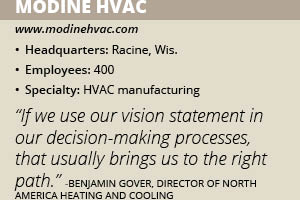Modine HVAC
Within the last century, Modine HVAC has earned the market’s trust as one of the most reliable manufacturers of HVAC solutions and that means more than customers having faith in the company’s current products. It also means that customers are confident that Modine’s future innovations will continue to set the example for efficiency, reliability and effectiveness. Director of North America Heating and Cooling Benjamin Gover says maintaining its status as the most trusted brand in the HVAC industry is built into Modine’s vision statement, which emphasizes the importance of Modine being recognized as experts. “If we use that in our decision-making process, that usually leads us to the right path,” Gover says.
The roots of what Modine is today began in 1918, when the company was already established as a successful manufacturer serving the automotive industry. But during a particularly severe Wisconsin winter, Arthur B. Modine developed a revolutionary heating unit for his facilities utilizing an automotive radiator, a fan and steam pipes. This was the first unit heater, and the first product of Modine’s heating division. Over the years, the company continued to refine and improve upon those original designs, developing new unit heaters and licensing the technology to numerous customers. At one point, the company says, Modine controlled more than 94 percent of the unit heater market in the United States, making the company’s name synonymous with unit heaters.
Showing Off
Gover says the AHR Expo is very important for Modine’s plans, as it provides another platform for the company to bring its Innovation Tour directly to the customers it wants to target. The Innovation Tour features a custom 53’ semi-trailer that serves as a mobile showcase for the company’s products. Focusing on each individual customer’s HVAC needs is key to the company’s strategy, and the Innovation Tour features the products the company develops, allowing customers and engineers to see first-hand the solutions Modine brings to the market. Gover says the tour also has the side goal of creating increased awareness of additional products the company produces.
 Gover says Modine had a lot to show at this year’s AHR Expo, including new products on the ventilation side. Gover says one of the biggest recent developments for Modine has been the expansion of its Atherion® line of commercial ventilation systems. According to the company, the customizable nature of the Atherion system makes it ideal for almost any type of climate, from the humid Southeast to the drier West. The addition of an advanced energy recovery module makes the unit into a high-efficiency dedicated outside air unit, as well, making it capable of saving customers on their energy costs. This summer, the company introduced a Coastal Coat Package specifically designed to protect the Atherion from the corrosive salt-laden air of coastal regions.
Gover says Modine had a lot to show at this year’s AHR Expo, including new products on the ventilation side. Gover says one of the biggest recent developments for Modine has been the expansion of its Atherion® line of commercial ventilation systems. According to the company, the customizable nature of the Atherion system makes it ideal for almost any type of climate, from the humid Southeast to the drier West. The addition of an advanced energy recovery module makes the unit into a high-efficiency dedicated outside air unit, as well, making it capable of saving customers on their energy costs. This summer, the company introduced a Coastal Coat Package specifically designed to protect the Atherion from the corrosive salt-laden air of coastal regions.
Gover says Modine also has been showing off some new products on the infrared heating side, in particular its high-intensity patio heater product. The company says infrared technology provides benefits over traditional outdoor heaters because it directs heat to objects rather than heating the air surrounding them. Without the need for a fan, the company adds, this creates a more energy-efficient option for keeping people comfortable in outdoor spaces. In addition to these innovations, Gover says, Modine also introduced new geothermal water-to-water heat pump products this year.
More Opportunities
The energy-efficient nature of Modine’s products has become an even stronger differentiator for the company than in years past due to the increasing focus property owners have placed on reducing their carbon footprints. At the same time, more stringent environmental standards have raised the bar in terms of what is permitted. Gover says Modine is working hard to ensure that its equipment not only meets the current EPA and Department of Energy standards, but also will be out in front of any future efficiency standards. Although this is a challenging prospect, Gover says Modine is confident that it can continue to drive development of ground-breaking technology solutions to stay ahead of the curve.
Gover says Modine sees the future as bright as the company continues to develop and expand its product lines in the commercial, institutional and education products, especially in ventilation. With the help of efforts like the Innovation Tour, Gover says the company sees some very positive trends moving forward in terms of growing existing markets and adding new markets. “I don’t think that trend is going to change for us in the near future,” he says.
Today, Modine remains one of the most successful and most trusted manufacturers in the HVAC world. The company’s heating and cooling products can be found in residential buildings, commercial facilities and schools, among other applications. Although the company continues to drive cutting edge technological advancements in the market, Gover says Modine still believes that relationships with partners and clients are the most important key to success. The company’s participation in the AHR Expo represents an opportunity for Modine to show off its latest innovations and build stronger relationships, and Gover says that is helping the company build a stronger future.